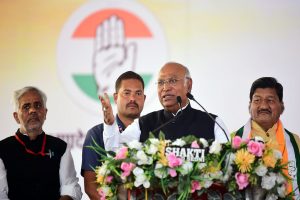As a newspaper headline describes the scenario aptly, ‘an endless caravan of misery’ is unwinding across the roads of India as millions of migrant labourers belonging to the poorer states and employed elsewhere are trudging home, having lost their means of livelihood due to the protracted lockdown and being abandoned to their fate by the government.
Some of them may not even be fortunate enough to reach home, given the uncontrolled chaos unfolding on our roads and the government’s limited capacity to mitigate their misery. Corona has mutilated the landscape of our economy, livelihood and social structure. It has stopped all economic activities, especially those that employed labour like farming, construction and manufacturing, throwing millions of migrants out of their jobs in their adopted states. And even if they reach home, nothing but a blank future possibly awaits them there.
One major reason for their misery, in fact for so many of them being out there on the roads in the first place, and walking along with their families and children under the scorching May sun without money for food, medicine or transport, is our archaic labour laws ~ some 200 of them ~ that have cast a vicelike grip on the economy ever since Independence. These laws ensured that the Indian economy remained overwhelmingly informal and continued to pay only subsistence wages to millions of workers without any social security. They prevented our demographic dividends to be reaped so far and are now unravelling a huge demographic disaster for the country. There is probably no other example in today’s world of a labour market that is so inflexible and restrictive. Let alone China, even Bangladesh and Vietnam had reformed their labour markets, but not India that aspires to have the fastest economic growth rate in the world and to become the most favoured destination of FDIs, despite having one of the lowest labour productivities in the world. It is the reason why ‘Make in India’ despite the Government’s strong push behind it, hasn’t been able to make much headway. We reform only when an existential crisis hits us, like in 1991.
But the 1991 reforms, transformational as they were for liberating the products and services sector from the stifling state controls, mainly concerned industries. They left two important sectors of the economy completely untouched ~ agriculture that still employs half the workforce of the country at a pittance of a wage for most, and the factor markets ~ land, labour and capital. Of these, agriculture and land are subjects in the State List while labour is included in the Concurrent List. The labour market in India, 90 per cent of it belonging to the informal sector ~ that is the first M of the MSME or micro enterprises ~ by and large, remains unregulated. They are not covered by the Labour Laws ~ about 44 Central and 150 State Laws; these laws apply only to the formal sector comprised by only about 10 per cent of the total workforce and regulate their conditions of work, wages, social security, industrial relations and employment security. Their applicability thresholds are defined by criteria like types of employment, size of the enterprise, etc. Labour, like agriculture, still remains prodigiously dominated by the Licence and Permit Raj we so fondly and proudly proclaim to have abolished.
Thanks to the economic crisis unleashed by corona, at least some states are now becoming alive to the urgent need to reform these sectors and have started taking some hesitant baby steps in this direction. It was reported recently that the Labour Commissioner in Pune had issued notices to two big companies ~ Capgemini and Wipro ~ apparently for retrenching their employees. It asked them to “refrain from laying off any employee or face legal action” and in the true Licence Raj style, asked them to report compliance. Whether these companies have retrenched some employees is not yet very clear, but even if they had, there should be nothing wrong in it. Given that it is an acknowledged practice for companies elsewhere to hire and fire according to their needs and depending on the economic cycle, it should logically be normal in times of economic downturn such as now to curtail their workforce so as to remain profitable, else they will have to wind up altogether, causing manifold losses in jobs.
But companies operating in India cannot do so because of a notorious piece of legislation called the Industrial Disputes Act 1947 (note the year) which mandates that a manufacturing firm with 100 or more workers cannot retrench anyone without prior government approval. If companies are unable to downsize their staff in times of distress, they will obviously prefer to remain small so as to avoid the ubiquitous labour inspector and other appendages of a control and command state, and use costlier technology instead to substitute otherwise cheaply available labour. This would shield them from any unwelcome interference by the State, even at the cost of low profits in the absence of scale, and hence keep wages small. Because of the pandemic now, there is a perceptible international backlash against China which is a vital link in the global supply chain.
Businesses with supply chains passing through China, which have suffered disruption in the crisis, are now thinking of ways to insulate themselves from China and explore alternatives. It is in this context that India hopes to attract foreign investments to become a hub in the global supply chain, and replace China as the contract manufacturer and exporter of the world. What stands in the way is our rigid labour architecture comprising business-unfriendly laws and policies, besides the power enjoyed by the trade unions. Despite significant improvements due to government initiatives, the ‘Ease of Doing Business’ still remains a problem in India visà-vis many other countries.
Without making it easier to hire and fire, the Ease of Doing Business cannot be improved and the hope of benefiting from the present global revulsion against China will forever remain a chimera. It is one major reason why the reforms enacted during the last six years have failed to create sufficient numbers of jobs. This has also failed to trigger the process of creative destruction in order to weed out inefficient industries, move labour across sectors, from the sick to efficient market performers and encourage innovation and reskilling of labourers for increases in productivity and profitability. Without nudging our overwhelmingly informal economy towards formalisation, social security for the workers cannot be ensured. In November 2019, the Central Government introduced in Parliament a new Labour Code on Industrial Relations Bill for rationalising some of the archaic provisions of our Central labour laws by amalgamating 44 labour laws including the Trade Unions Act, 1926, the Industrial Employment (Standing Orders) Act, 1946, and the Industrial Disputes Act, 1947 into four codes ~ on wages, industrial relations, social security and safety, and health and working conditions,. It would have gone a long way to improve the ease of doing business, but before the Bill could be passed into an Act, corona took over.
Reeling under the onslaught of corona and desperate to revive industrial growth, three state governments ~ UP, Gujarat and MP ~ have now introduced a slew of measures to reform their respective State labour markets. Early in May, they have issued ordinances suspending most of their labour laws and eliminating intervention by the labour department. Madhya Pradesh has allowed industries to increase workers’ shifts from eight to 12 hours, renewal of Factory licence only once in 10 years instead of annually, liberty to hire labourers according to requirement by MSME units and shops to remain open from 6 a.m. till midnight. It has exempted new manufacturing units from all but a few provisions of the Factories Act, 1948 for the next 1,000 days. It has simplified the registration and return submission requirements by industries, replacing the provision of maintenance of 61 registers and 13 returns by just one return under self-certification and virtually prohibited inspection by the labour department.
UP has exempted all establishments, factories and businesses from the purview of 38 labour laws for three years. The few provisions that have been kept intact include those pertaining to minimum wages, safety and social security, child and bonded labour. The dismissed employees are now to be paid terminal wages at the rate of 45 days for every completed year of service. Predictably, trade unions including the RSSaffiliated Bharatiya Mazdoor Sangh (BMS) that stand to lose their collective bargaining powers aren’t happy. BMS has termed the new legal structure as the absence of the rule of law and a bigger pandemic than coronavirus; it has threatened to take the states to the International Labour Organisation (ILO) which usually defends and upholds the bona-fide rights of the trade unions.
(To be concluded)
(The writer is a commentator. Opinions are personal)











